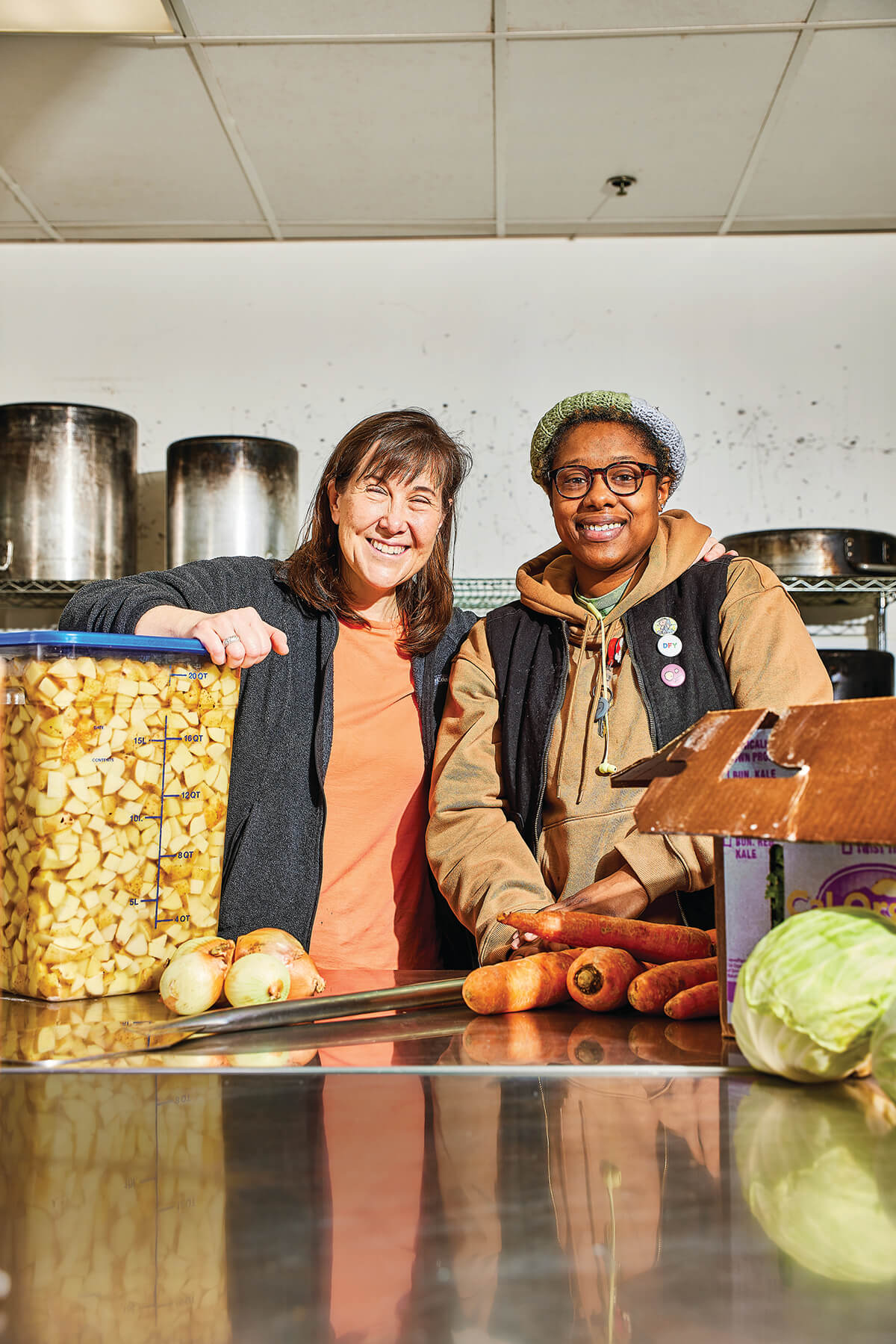Food & Drink
Love & Cornbread Serves More Than Food in West Baltimore
Meet the crew behind the small-but-mighty food-equity nonprofit, which pops up in the neighborhood every Saturday afternoon to serve meals and connect with residents.

Inside the long, bright, shared workspace of Bmore Kitchen in Mid-Govans, Sue May is standing like a daffodil in a snowstorm. With her sleeves rolled up, she shifts a box of organic lettuce across a stainless-steel table as dozens of other business owners rush between their own tasks.
Her head chef, Kiara Young, aka “Kyeez,” has unloaded cartons of milk in the walk-in cooler and now turns her attention to a surplus of broccoli. In a few hours, when a half-dozen volunteers show up, they’ll whip it into cheddar soup—just one part of the 400-some meals to be made for their community this week.
“Do you like granola?” asks Young, before setting off in search of a to-go container studded with oats and pumpkin seeds.
“You can’t stop her from feeding people,” says May, with a shrug and smile.
In truth, those words could be a motto for Love & Cornbread, the small-but-mighty food-equity nonprofit founded by May in 2020. That August, in the midst of the coronavirus pandemic and a nationwide racial reckoning, the Mount Washington resident felt an urge to give back.
The home cook made a large batch of macaroni-and-cheese and headed to the busy corner of Pennsylvania and North Avenues in what could’ve been a bold move—this middle-aged white lady showing up in a notoriously under-resourced Black crossroads of Baltimore, near a site of protest following the murder of Freddie Gray. But all 35 servings disappeared quickly, and conversations with strangers about food and family inspired her to return. Nearly four years later, she hasn’t missed a Saturday since.
“West Baltimore gets such a bad rap, but if you show up, and are doing service to the community, and are doing it respectfully, people are going to recognize that, and jump right in to help you,” says May matter-of-factly, noting that many resources, like Health Care for the Homeless and Our Daily Bread, are located on the city’s east side. “At least that’s what my experience has been.”
In fact, in her second week serving in Penn North, Brandon “Coach” Campbell popped his head out of the Phase 2 Barbershop and offered exactly that. May calls him her co-founder, and the two hit it off immediately, with “Coach” educating her about the neighborhood, introducing her to community members, and always encouraging her to keep going.
Soon, she added volunteers, moved to a commercial kitchen, and eventually met “Kyeez,” a Crust by Mack alum and multi-generation Baltimorean with family in nearby Sandtown-Winchester, who joined the nonprofit last fall.
“Saturdays?” poses Young. “It’s a vibe.”
On that day, every week, just before noon, rain or shine, the Love & Cornbread crew sets up outside of Phase 2, where hugs, high-fives, and how-are-yous are exchanged as they hand out hundreds of soups, sandwiches, and, of course, cornbread, all scratch-made with quality ingredients—including produce from the So What Else regional food redistribution nonprofit and local growers like the Rock Rose Food Justice Project and First Fruits Farm.
“This is my most prized possession,” says Young, holding her cell phone close to chest, then pulling up a photograph of an elderly woman, standing in the sun on the city street, eyes closed, savoring that namesake treat. “It felt like feeding my grandmother. This is our corner, you know what I mean?”
Over time, some of those same folks in line have also started volunteering to serve, which May calls “the greatest compliment.” Beyond food, the nonprofit offers other essentials, too, such as hand warmers in the winter and cool rags in the summer. And in a neighborhood hit by the opioid epidemic, they also partner with the state of Maryland to provide Narcan overdose treatment, as well as information about the nearby Tuerk House for recovery.
“It’s a natural extension of our work,” says May, who retired as an education consultant last summer to focus full-time on Love & Cornbread. “Food is harm reduction.”
This spring, they hope to add a lunch catering service to the nonprofit’s offerings—with proceeds allowing them to hire more kitchen support, produce more food, and make a greater impact—while also partnering with the Franciscan Center for culinary externships. A retail cornbread mix might be in the works as well.
But why cornbread, of all things?
“It’s always been a comfort food for me—it’s warm, buttery, salty, sweet,” says May, whose mother grew up in Tennessee and made it regularly. “It’s not your entrée. It’s not your vegetable. Maybe it’s your dessert. But it’s just that little something extra that someone does to make you feel loved. And I think that’s pretty universal.”